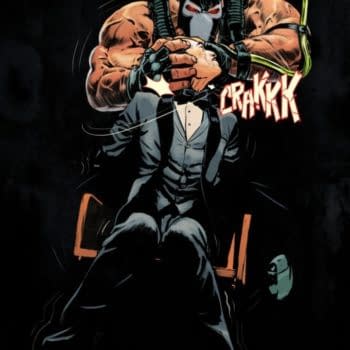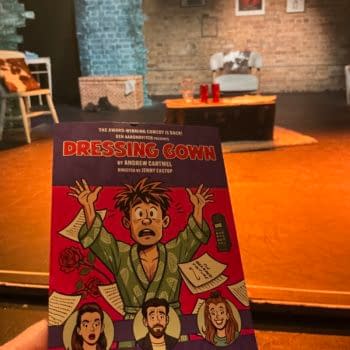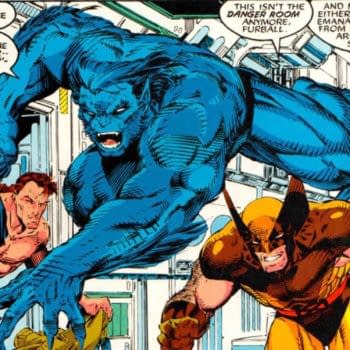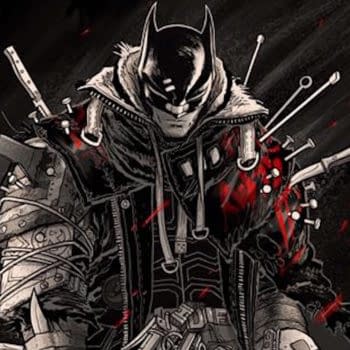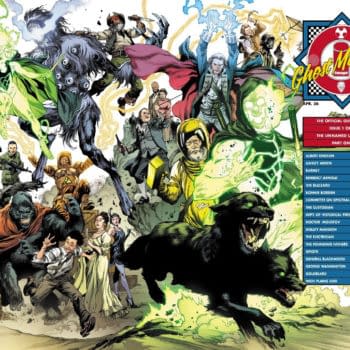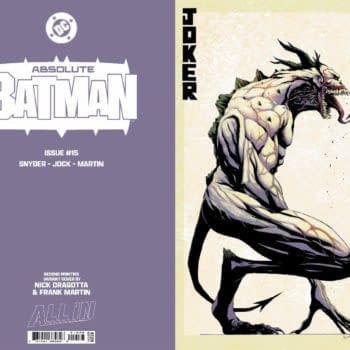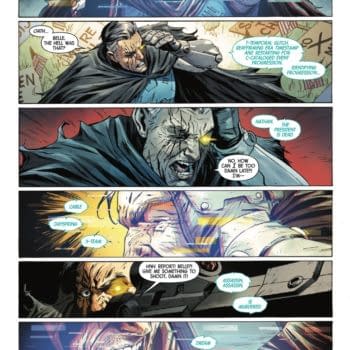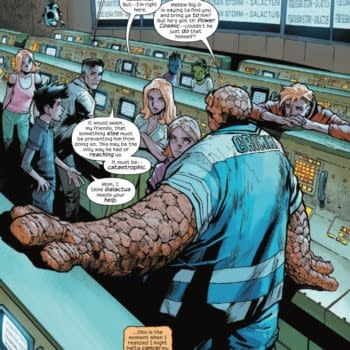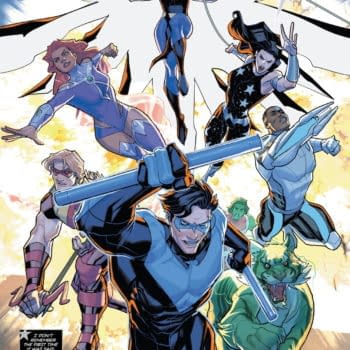Posted in: Comics | Tagged:
When Alan Moore Talked About DC Comics And Watchmen Sequels…. Back In 2010
This is a reprint of an interview that ran between Bleeding Cool contributor Adi Tantimedh and Alan Moore back in 2010, as news of the Before Watchmen prequels was beginning to leak out, collectively referred to at the time as Watchmen 2, even if it was an inaccurate title. Today sees the publication of Doomsday Clock #1 by Geoff Johns and Gary Frank, an actual Watchmen sequel. As the website embargoes over Doomsday Clock #1 are lifted, it seemed an appropriate time for a re-run.
For a twenty-five year old comic, Watchmen is still a major player at DC Comics. Back in February of this year, they announced an upcoming miniseries to be written by Grant Morrison, featuring one-shots each set on a different alternate Earth in the DC Multiverse. Wizard magazine published a piece of artwork by Art Adams that featured characters from various Earths fighting, and most prominent amongst them was Rorschach from WATCHMEN. At the same time, Rich Johnston first reported rumours on Bleeding Cool that DC was planning to launch prequels, sequels and spin-offs of WATCHMEN after the movie from last year had made the graphic novel their bestselling book of all time.
In an interview with Grant Morrison in March 2009, he said he was not actually writing a WATCHMEN spin-off or sequel, but an alternate-Earth one-shot featuring the Charlton characters who inspired WATCHMEN, and in the style in which WATCHMEN was written. They appeared in Final Crisis and will return in his upcoming Multiversity project.
This raises some questions. If we are to presume DC Comics owns WATCHMEN, why didn't they go ahead with plans for prequels, sequels and other spin-offs without Alan Moore's permission? Or are there other issues going on?
Alan Moore has decided to set the record straight in what has been going on with WATCHMEN and the circumstances behind DC's approach to him. Alan's cadence does not always come over perfectly in written interviews, he often speaks in a tongue-in-cheek fashion, especially when talking about himself, so we we suggest a little warming up first. Also these are the personal opinions of Alan Moore, and others' version of events may differ dramatically.
But then again, don't they always?
This interview was conducted on Wednesday August 18th 2010 by Adi Tantimedh.

Well, I suppose the short answer is on one level, I am finished with Comics and disgusted with the practices of the comic book industry. With regard to the specific issue of WATCHMEN. I think it's more fair to say that I would never dream of taking the rights to WATCHMEN back under the terms that they were offered to me.
So what are the terms they were offering?
Well, this requires a little bit of backstory, Adi, so you'll bear with me. This all goes back to the time before I even heard that they were definitely going to be doing a WATCHMEN movie. I received a phone call from Steve Moore, who'd been without work from DC for 18 months, couple of years by that point, as had nearly all my close British associates who had been working with me on ABC. It seemed to me at the time that this was probably some sort of retaliation for the way in which I had finally become disgusted with DC Comics and their subsidiaries, and had publicly walked out and severed my connections with them. Sometime shortly before I heard there was going to be a film, I had a phone call from Steve Moore saying that perhaps there wasn't any kind of blacklist, because he'd just had an offer from DC to write the computer game based upon WATCHMEN. They also said to him, "We haven't told Alan about this yet." At which Steve, who had got a little bit of work of his own around that time, said, "Well, I can't take on any work because I have work of my own, and also I would never dream of taking anything if Alan hadn't been consulted."

Right.
Then Steve told me. And it seems to me that possibly because they know that I would do almost anything to make Steve Moore's life easier, since he is my oldest and dearest friend, that they were hoping to present the WATCHMEN computer game to me as a fait accompli; that they would put me in a position of either playing along cheerily with the computer game or having to refuse work to my oldest and dearest friend, when I knew that he needed it. Now, what they didn't know at the time was that Steve's brother Chris had just been diagnosed with Motor Neuron disease, which is a disease which is fatal, which is incurable, and which in 99% of cases will just make you steadily more paralyzed until eventually either your heart or your lungs stop. So this is a painful illness to go through and it's a painful one to watch a loved one go through. Now, I phoned up Wildstorm and asked them to pass on a message to DC, that I understood that they had been trying to put moral pressure on me through Steve Moore, and that they didn't know that Steve's brother had recently been diagnosed with Motor Neuron Disease, but I was informing them of that point, and also was stressing that they really shouldn't try pulling any nasty little tricks through the medium of Steve Moore because Steve Moore had a dying brother. And a matter like a dying brother, as I put it, is more important to ordinary people than the machinations of the people who publish Batman comics. So I asked them and advised them not to do anything like that in the future now that they knew the situation. Then I heard about the film and just maintained my usual policy, once I made sure my name wasn't on it and the money would be going to Dave Gibbons, I basically was reasonably content with that, if I didn't have to have my name associated with the film, which I was convinced would probably be rubbish, at least in my opinion. And I remember having a conversation with Dave Gibbons back around then where he was expressing some concern, I think we were both concerned that problems might arise from the fact that we both had different opinions of the forthcoming film, even though we both respected each other's opinions. That was my understanding, that I had no problem with Dave being in favour of the film, and vice versa. When he suggested that he was worried that our friendship might not survive some of the pressures put on it by the film, I said to him there was no chance of that as long as he just gave me a call and thanked me for the film money when it arrived. And I pointed out that David Lloyd hadn't done that, and that had affected our friendship in that I'm not expecting to have very much to do with David Lloyd in the future. Dave Gibbons assured me that he would phone up and thank me for the film money. He made a typical joke about it. In Dave's jocular fashion, he said that he'd phone me from the deck of the yacht that he bought with the money and we had a laugh at that. So that was how we left it.
It was a little while after that that I had a phone call from Steve Moore saying that he'd been contacted by Warner Books, for whom he'd done an extraordinary job of writing the novelisation fo the V FOR VENDETTA movie. He wrote the entire book in a month, which is something very few writers these days would even think about doing. And they had talked to him about how he would be the only possible writer they knew that I would be happy with writing the WATCHMEN novelisation. And they offered him the job. This was at a time when Steve really needed the money because he didn't have any work and it was the year in which he expected to lose his brother. So that money was a very welcome cushion, and the thought that he might have an income in that year was a great consolation to him because it meant that in the expensive and unfortunate time around Chris' impending death that he'd at least have the wherewithal to take care of all of the things that might arise. So I said that I was really happy to hear that and yes, there wasn't anybody else that I would have cheerfully allowed to do the film adaptation, and that he would be the best person for the job, so we left it at that.

Then a couple of weeks thereafter, I got a phone call from Steve Moore saying he'd been contacted by Warner Books and that they told him that they weren't going to be doing a WATCHMEN book and that the job was off. At that point, it seems to me, I understood what 'Alan will be quietly compliant' had meant. It seems to me that what they meant by that was that "Alan realises that if he says no to this or kicks up any trouble, then we're going to take away the money from his friend, as we've been informed, whose brother is dying from Motor Neuron Disease." So it seems to me that they were exerting a kind of pressure upon me through Steven and his dying brother that was execrable, that was inhuman. At this point, I made my feelings known about the matter and went and spoke to Dave Gibbons about it. He still professed not to know what 'Alan will be quietly compliant' was supposed to mean. He was certain that his friends at DC would never have done anything like that. I said that actually, the only perceptions that were important in this were mine. This was what I perceived had happened. I didn't need it proven in a court of law, I mean these people had deniability. But that was the only explanation and short of an explanation of what 'we expect Alan to be quietly compliant' meant, which I've never received, that still is the only scenario that makes any sense to me. So I said to Dave Gibbons, "For the sake of our friendship, Dave, I think it would be better if you and I did not discuss WATCHMEN ever again." Obviously, it was something that both of us felt a little upset about, but it was the only way that I could stop Dave from ever being used to pass on creepy little messages to me, with or without his knowledge. So Dave agreed to that.
The next thing I saw was something in The Guardian Guide over here. It was set out to look like an interview with Dave Gibbons, but there wasn't a journalist's name attached and it did have 'film promotion' lettered above it. So this was a paid advert for the film. During the course of the interview, although my name wasn't supposed to be attached to this film, the interviewer, presumably somebody on the Film end of things, had asked Dave if he'd had any contact with Alan Moore, at which Dave said that he was assured we were still friends, but I had asked him to never talk to me about WATCHMEN again. This was said without any supporting reason more or less as if it was just an example of 'that crazy Alan Moore with his crazy long hair and his crazy ideas'. So I was a little bit irked by that, particularly because I hadn't received a phone call from Dave yet thanking me for the WATCHMEN money. I don't know… because I had a friendship with Dave that went back 25 years, I was thinking maybe he thinks that thanking me for the WATCHMEN money would constitute a conversation about WATCHMEN, so I was in two minds about what was happening. Then a little while ago…
How long was this?
This was about a month, something like that.
Oh, right, so it was maybe June of this year?
Yeah, sometime in June. I received a phone call from Dave Gibbons in which I probably did sound a little bit unfriendly on the phone, because it was very clear that he wasn't phoning up to thank me for the WATCHMEN film money and I figured that he was probably phoning up to talk to me about something else to do with WATCHMEN. I was busy at the time, I told him to call me back on the Monday. Sure enough, he said, "Alan, got a few minutes? I just want to talk to you about WATCHMEN." So I said, "As long as it was a few minutes only, Dave, and if that is the end to it." He then went forward — I didn't let him get very far — but he said, and I knew, that he had always been opposed to the prequels and sequels of WATCHMEN and had always had the assurances of people like Paul Levitz at DC that that would never be done. But of course, those people aren't there anymore and it was a different regime, and I had heard that the new Head of DC had announced that she really wanted to pursue some of DC's key properties, by which I assume she probably meant WATCHMEN. I think she may have even mentioned it, I don't know. So I said to Dave that yes, I had heard about this and he was saying that he knew the thing that I always wanted was the rights to WATCHMEN back. This was said with the kind of understanding that if they gave me back the rights to WATCHMEN, then I would in return sign over the rights to secondary properties such as, oh I don't know, Rorschach comic books, sequels, prequels, all of these things…
TV series, things like that?
Yeah, all of these things, potentially, when you think about the different mediums these could be exploited in. Potentially endless properties that could be spun off of WATCHMEN. Now, I stepped in and said to Dave that actually, no I had grown so sick of WATCHMEN over these last 18 months that I didn't want the rights back anymore. If they had offered them back to me back when I wanted them, ten, twenty years ago, then maybe this could have all been resolved in a friendly fashion. But no, I wasn't going to take the rights back at this stage after they had pretty much, in my opinion, raped what I had thought to be a pretty decent work of art. I didn't want them throwing me back the spent and exhausted carcass of my work and certainly not under terms that would apparently allow them to go on producing witless sequels and prequels ad infinitum.

Exactly. It sounded like to me — when I said I didn't want the rights back, Dave Gibbons quickly switched to Plan B, which is apparently that they would make me a very large offer, I got the sense that they were talking, what, a couple of million, something like that, to sign over all of my rights to WATCHMEN. Which I again rejected for much the same reasons. This all took about two or three minutes and that concluded the conversation. I imagine that this will probably be the last one I will be having with Dave, which is very regrettable. I do tend to get the feeling that everything that I say is being ignored. All the things that I ask to have done are just completely ignored. So that was how we left it. And I've been thinking about it since then, and several things have occurred to me. I should imagine that if Warner Brother-DC are offering me the used-up and presumably pretty much spent rights to WATCHMEN back…
The literary rights.
…and they're offering me a couple of million dollars, perhaps — no figure was actually mentioned, but I got the impression it would be something like that — to buy out the rights to WATCHMEN, then that would seem to indicate that yes, WATCHMEN as a property from their point of view is reaching the end of its natural life…
As a book, anyway.
,..yet the possible spin-off properties are probably of considerable value to them, where you'd think the least of it is comic books anymore. We're talking about movies, we're talking about all of these different media platforms that the property could be exploited upon, I should imagine that that would probably be worth a great deal of money that potentially DC would be able to make. And also, the way I understand the industry to be run now, there are probably investors out there with piles of cash that are looking for something to invest in, and yet as far as Warner Brothers goes, and certainly as far as DC Comics goes, then from where I'm sitting, it doesn't look like they've got a great many marketable properties. There are clouds of question marks that hang over some of their properties… I mean, I don't know whether the ongoing Superboy case has been settled…
It hasn't. It's getting uglier as we speak, in fact.
That's pretty much what I've heard. That of course puts a big question mark over some of DC's characters. The Batman movie films, I understand that the last couple have been done by a better-than-average director, but I wouldn't have thought that he'd be sticking with that franchise forever or if that's what he wants to be known for.
It isn't.
So that's not going to last forever. And pretty much that's it. I mean, compared to Marvel Comics, at least for the moment, Marvel seem to have a much large raft of marketable characters than DC-Warner, who have practically nothing except for properties like WATCHMEN, which could conceivably spin off into games, movies and potentially TV series and all of these different areas and could bring in a huge amount of money. I should imagine that DC also would not have made me these offers out of the kindness of their heart or because they felt bad about the way they treated me in the past.

Yeah, it was a bit of a surprise. But thinking about it, I don't know. I mean, like they made a lot of trouble for themselves with their laxity on the contracts on the WATCHMEN film, say.
Right.
As I understood it, they didn't realise until after they'd made the film for, what, 200 million? That was ostensibly what they said it cost to make the film. When they'd made that film, they were then notified by 20th Century Fox that actually they had sold all the rights to make that film and distribute back when I was talking to Terry Gilliam back in the 1980s. And I understand that this led to a fairly punitive settlement between Warner Brothers and Fox whereby a ton of money had to be handed over in order for Warner Brothers to release their already very expensive film. So contractually, I'm not sure that the people at DC always know what they're doing. I'm reminded of the fact that apparently they possessed the comic book rights to James Bond. From about 1960 onwards, they published a SHOWCASE title of DR. NO. It didn't do very much and they promptly forgot about it. I presume that it was about 20 years later… so maybe they'd got the rights for 20 years during which James Bond was at the height of its popularity, they didn't even realise that they owned the rights to the property. So these are people who are a bit slapdash in their contractual work in the past. It strikes me that the WATCHMEN contract which after all were signed upon the understanding, we were led to believe, that we would have the rights revert to us as soon as the books went out of print, which in the industry standards of the time, it was inconceivable that that would be more than 12 months. There had never been a comic book until WATCHMEN that had actually been in demand for more than 12 months, let alone 25 years. So immediately it became apparent that DC weren't going to let WATCHMEN go out of print, we had suggested that in light of the success of WATCHMEN, perhaps our contract could be re-negotiated. DC were very reluctant to do this, even though there were things coming up that were starting to make it impossible for me to carry on working with them. The fact that I felt we had been swindled out of our just desserts on WATCHMEN, the property had been taken away from us by stealth or at least in my opinion, that was going to drive a huge wedge between me and DC Comics, which it did. It didn't seem to me to be the brightest move, that from where I was standing, in that WATCHMEN seemed to have been the biggest boost to the comics industry and specifically to DC Comics, that they could have possibly expected.

It revitalized a moribund industry. It changed the face of Comics. And so I would imagine that given our understanding of the industry standards during that time, and given the fact that, as I say, DC's contractual stuff sometimes seems to be a bit shaky. So there may be… I mean, it's occurred to me that I could possibly get a lawyer to look into this. There may be some problem with the contract, or some potential problem that may require my actual signature saying it's okay to go ahead with these prequels and sequels. It might be that they can't just do this. It may be that… it would seem that if they had gone out of their way to try and tempt me with worn-out rights to a property that was mine anyway, or sums of money… they're offering me a million or two million, then I would imagine that what was potentially on offer to them would be higher by a couple of factors, maybe two or three factors, who knows? It could be a huge amount. So this would seem to explain their apparent desperate need to get me to put my signature upon something, which I'm not inclined to do. This is because I actually felt that the work we did on WATCHMEN was somehow special. I have got a great deal of respect for that work. I do not want to see it prostituted. This has always been my position. I don't want to see it prostituted and made into a run of cheap books that are nothing like the original WATCHMEN which, anyway, wouldn't work if it was dismantled. Those characters only work as an ensemble. A comic book about Doctor Manhattan would be really obtuse and boring. A comic book about Rorscharch would be really miserable. They only work together in WATCHMEN, although I'm sure there are perhaps people out there in the industry who would like to be the artist or writer on some WATCHMEN prequel or sequel simply to have their name attached to a successful property for once. When Dave Gibbons phoned me up, he assured me that these prequels and sequels would be handled by 'the industry's top-flight talents'. Now, I don't think that the contemporary industry actually has a 'top-flight' of talent. I don't think it's even got a middle-flight or a bottom-flight of talent. I mean, like I say, there may be people out there who would still be eager to have their name attached to WATCHMEN even if it was in terms of "Yes, these are the people who murdered WATCHMEN". I don't want to see that happen.
Despite the fact that you could make a lot of money out of it?
I don't wish to make money out of my characters being put through a lot of lame moves, which can do nothing but discredit the original work. I was always a bit surprised by the way in which this was presented to me. I mean, I would have thought that if I had been the person taking over DC Comics after Paul Levitz had, what was it, he stepped down to be a writer and consultant? I would have thought if I was approaching the problem from the point of view of the new Head of DC Comics, that I would have perhaps tried to present that as an opportunity for saying the decks had been cleared, that the old regime that caused me so much trouble was no more, and we could have a fresh start. Who knows, I might have even gone for it, but instead we get these imperious announcements that DC will be pursuing some of its more profitable properties. And then we get these clumsy approaches through the medium of Dave Gibbons after what had already happened so that I am almost bound not to want anything to do with that whole business ever again. It seems to me clumsy and inexpert, and I guess that maybe the new people running DC don't have a lot more talent or forethought than the people running it before, at least in my opinion. It's difficult to see what they were trying to do with that one. At least, they could have handled it more intelligently, you know, but they didn't, and now the situation is what it is.
So this is why you said you were walking away from Comics, but it's not Comics the medium but Comics the industry you're leaving?
Absolutely. I've always said that I will probably love the comic book medium forever. Yes, I'm working in an awful lot of different media now, but then that has pretty much been the case throughout my career, although there has been a heavy bias towards comics. I've always been working on side projects, on musical projects, pretty much throughout the entire 25, 30-year span of my career. So it's not the comics medium that I'm moving away from. I mean, I'm still having a great deal of fun doing THE LEAGUE OF EXTRAORDINARY GENTLEMEN with Kevin, you know, and various other bits and pieces, but the Comics Industry I am repulsed by, and this is not anything that I went out of my way to engineer. I had nothing but love for the comics industry when I entered it. It could all have been so different. The only thing that happened was that when I felt that I was being cheated and robbed, where initially we put forward lots of sensible ways that that situation could be rectified with no hard feelings on either side, these were completely ignored and indeed everything I've said since has been completely ignored, even my request that Dave Gibbons shouldn't phone me up with more messages from his bosses at DC. There doesn't seen to have been a single occasion during the entirety of this sorry trail of tears in which the things that I've said have even been listened to. So I feel that I have to put the record straight upon this. This is my reputation that is on the line, and the reputation of my work. In some ways, it's like when I launched into my bitter tirade with the V FOR VENDETTA film. I wouldn't have done that if people associated with the V FOR VENDETTA film hadn't been saying things about me that weren't true, hadn't been saying that yes, I was thrilled about the film and that yes, I'd been talking to the Wachowski Brothers when they knew that these things things had never happened. Now I can't sit by and just let people make up anything that they want about me, and since I do have a certain profile, nor do I need to. So you know, it's not as if I have some vendetta against the comics industry, I just want them to leave me alone and to leave my work alone. I don't want anything to do with the comics industry in future. This is regrettable because I've got a lot of old friends in the comics industry. However, given the way that Dave Gibbons was apparently used as a messenger boy, it seems to me that I can't really afford to have any contact with anybody who is employed in the mainstream comics industry, because, it's a shame, they may have just wanted to get in touch for old times' sake, but I can never know that for sure anymore, because I've been given an illustration of what they are prepared to do in order to get me to play ball. It seems, at least in my opinion, that they have been completely ruthless and utterly inhuman in pursuit of this. And I reserve the right to state that opinion. I certainly am not going to meekly fall into line and sign away the rights of my property because that would be as good as saying "Yes, well, the business about you threatening Steve Moore and his dying brother, at least in my opinion, that's all okay, let's forgive and forget. The fact that you're going to turn over these characters and this work that I was so proud of to a bunch of people that I consider to be hacks to simply dilute it and degrade it for your commercial profit, that's all okay by me." No, that isn't going to happen. That is a thing that I will go quite a considerable way to stop happening. So it's not a matter of me airily turning down the copyright to WATCHMEN. If DC were to stop publishing WATCHMEN so it went out of print and then the rights automatically reverted to me and to Dave Gibbons, then you know, fair enough. Those were the terms under which I understood this would be happening. But certainly I'm not going to accept an offer where it seems to me they are simply attempting to throw me a relatively small sum of money or give me the rights to a property back that may well be pretty much used up from their point of view, in order to get me to give them the go-ahead upon all these potentially very lucrative projects. No, like I say, that is something I'm very adverse to. And I'm surprised they moved on in such a clumsy way, you know, but I guess that's DC Comics.

Well, yeah, we'll see what they do. I'm hoping that since I'm definitely not going to be signing these rights over to them, that they might just desist, and, I mean, all right, I can understand this, if Warners don't have any properties that are worth anything, or at least not worth very much in comparison to someone like Marvel Comics, I can understand that they might get a bit desperate. I mean, just recently, my latest royalty cheque was two months late, which I can only interpret in two ways: either everybody's royalty cheque was two months late, which would indicate that DC are perhaps a bit short of money? I don't know if that's true, but that's certainly one way that you can construe it, or the other way is that only my royalty cheque was six weeks late, which again would look like this was some clumsy attempt to put financial pressure upon me to go for this multimillion pound WATCHMEN offer, which again would suggest a level of desperation and creative impoverishment regarding Warner Brothers. I don't know. This is just my appraisal of these things, but it's… I don't know, again, a funny thing to do if they see these things as being as important as they seem to think they are. At the end of the day, if they haven't got any properties that are valuable enough, but they have got these 'top-flight industry creators' that are ready to produce these prequels and sequels to WATCHMEN, well this is probably a radical idea, but could they not get one of the 'top-flight industry creators' to come up with an idea of their own? Why are DC Comics trying to exploit a comic book that I wrote 25 years ago if they have got anything? Sure they ought to have had an equivalent idea since? I could ask about why Marvel Comics are churning out or planning to bring out my ancient MARVELMAN stories, which are even older, if they had a viable idea of their own in the quarter-century since I wrote those works. I mean, surely that would be a much easier solution than all of this clandestine stuff? Just simply get some of your top-flight talent to put out a book that the wider public outside of the comics field find as interesting or as appealing as the stuff that I wrote 25 years ago. It shouldn't be too big an ask, should it? I wouldn't have thought so. And it would solve an awful lot of problems. They must have one creator, surely, in the entire American industry that could do equivalent work to something I did 25 years ago. It would be insulting to think that there weren't. That's just my suggestion for a way that DC could remove themselves from this thorny impasse, but we shall see.
And on that note, I think that's a very good place to end.
Adi Tantimedh has written radio plays for the BBC, and various scripts for both Britain and Hollywood, including ZINKY BOYS GO UNDERGROUND, which won the British Academy Award for Best Short Film in 1995. He has also directed short films that premiered at international film festivals. He has written the graphic novels JLA: AGE OF WONDER for DC Comics, BLACKSHIRT for Moonstone Books and most recently, LA MUSE for Big Head Press. He also works as a story editor and consultant for animation, video games and feature films. He writes Look! It Moves! for Bleeding Cool.








